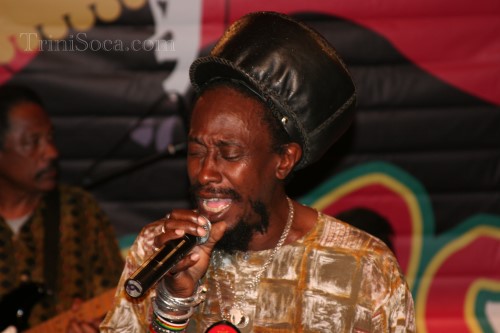|
|
|
Brother Resistance Speaks
|
Rapso Workshop: Brother Resistance Speaks
Staff Article
Interview Recorded: April 15, 2006
Published: June 09, 2006
The most important element of the 2006 Rapso Festival was the Training Workshops. The workshops were held at the Amphitheatre in the National Library on Hart and Abercromby Streets in Port of Spain. We interviewed Brother Resistance who shared a brief history of the Rapso art form and the objectives of the workshops.
TRINISOCA: Brother Resistance, could you give us a brief history about the Rapso Tradition?
BROTHER RESISTANCE: The Rapso Tradition is really an ancient experience that is traced back to the oral traditions of Africa, the mother of all civilization. We look at the character called the Griot who was a poet and spokesman for the community or the tribe. The Griot is the person who would have the history and the knowledge of the community. There is also the ancient experience of the drum, the first instrument greeted by man on earth. These two ancient experiences survived the slave trade. They manifested inside of slave plantations. The Griot whose name was changed to Chantuelle, when it manifested again, it manifested in the Trinidad Carnival. The Chantuelle went on to become what is known today as the Calypsonians and by extenstion the Soca artistes. It manifested in the experience of the Pierrot Grenades. The Pierrot Grenades distress the English language by breaking down the big English words. It manifested in the character of the Midnite Robber. The Midnite Robber is a very crucial character in our cultural history of the world. The original Rapper would be the Midnight Robber. The Midnight Robber would have been rapping long before the times of the turntables, CD changers and microphones. Those ancient experiences are really what would establish the ancestry for what we do today as Rapso.
We like to credit the late Lancelot "Kebu" Layne as the person who brought all these experiences together. He used the rhythms from the steelband yards. In his recordings he emphasized the traditional drums. He would go against the so-called authorities in music. He would also go against the so-called authorities in poetry and bring this thing that we call Rapso.
We, the Network Rapso Riddum Band coined the term Rapso, but Lance would be the person who really provided the foundation for what we do today. His first recording was a song called "Blowway". It was the song that started the Rap Revolution in the music industry throughout the world. He was like the father of the movement. The mother of the movement was the late Cheryl Byron. She was the first Rapso poet to perform in a Calypso Tent. She went abroad and continued her work in North America combining the Rapso poetry with theatre and dance in a complete package.
Out of that came the Network Rapso Riddum Band in East Dry River, Laventille. You could say these things were passed on to us. We ran throughout the 80s until the new wave which brought the younger people like Kindred, Homefront, Ataklan and Sister Ava. They came through that space and really gave the art form more life and more vibes. They gave Rapso the pulse of the times and led us into the new millennium so to speak. In the new millennium artistes like 3 Canal stood out. They did more harmonizing in terms of the vocal work. 3 Canal, Black Lyrics and a number of other groups were flying the flag till where we are today.
The Rapso Festival has been going on now for about fifteen years. The most important component of the Festival is the training workshops. In the training workshops we are able to pass on information to the participants. In doing so we are trying to help or support the coming of new artistes, new writers and new performers, to embrace the space where Rapso has carved out for itself. This is the most important thing in the festival for us. We sacrifice a lot to make sure that we do these workshops. We want to make sure that having done the workshops, we present the participants in a show called Breaking New Ground, where the public would acclaim them. From there they could continue.
TRINISOCA: Do you all have any plans to take this into schools?
BROTHER RESISTANCE: We want to do that very much, but the problem is resources. We have been trying to get people to support what we are doing. Going into a school you need to give up your day job so to speak. We are not in an 8am - 4pm job. On our agenda is definitely to go into the schools and the various communities to carry this work that we are doing. We will be teaching Rapso and we will also be teaching about life. We are also attempting to empower our young people to embrace life with a different kind of attitude. We think that is very essential in this crucial time that our nation is going through.
TRINISOCA: Is there anything you would like to share with the people out there who have never heard about Rapso?
BROTHER RESISTANCE: Well, Rapso is more than an art form. It is really an attitude. We in Trinidad and Tobago and the Caribbean are still in a situation where even though the country has gained independence, the colonial Jumbie is forever present. It is there in our institutions and in our education system. It also comes through the television. Everything is like foreign impressions. Through Rapso we embrace an attitude that would help to fight against that sort of thing and to establish ourselves to the world. We can say to the world, "This is who we are. We are people too. Take us as we are or clear the way and let us pass". Rapso has come to do that.
TRINISOCA: Thank you.
Rapso Explosion 2006 in Pictures:
www.trinisoca.com/gallery/Rapso
|

|
